沪教牛津版-英语-八上-初中英语八上 Unit7精编学案与习题
新版沪版初中牛津初中英语八级上册Unit精编学案与习题
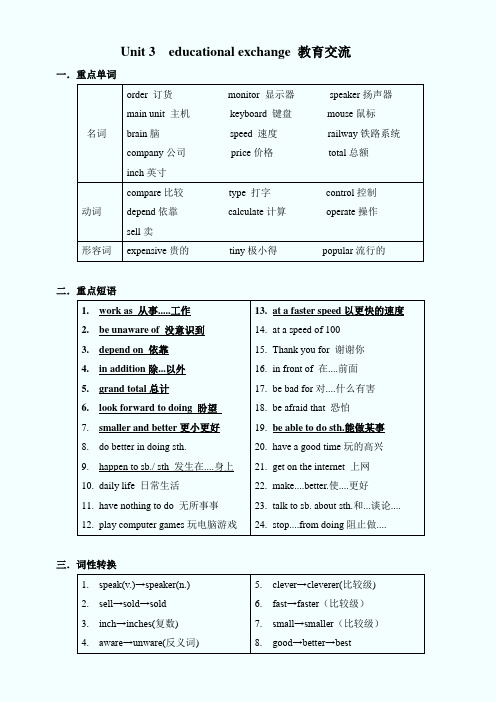
Unit 3 educational exchange 教育交流一.重点单词名词order 订货monitor 显示器speaker扬声器main unit 主机keyboard 键盘mouse鼠标brain脑speed 速度railway铁路系统company公司price价格total总额inch英寸动词compare比较type 打字control控制depend依靠calculate计算operate操作sell卖形容词expensive贵的tiny极小得popular流行的二.重点短语1.work as 从事.....工作2.be unaware of 没意识到3.depend on 依靠4.in addition除...以外5.grand total总计6.look forward to doing 盼望7.smaller and better更小更好8.do better in doing sth.9.happen to sb./ sth 发生在....身上10.daily life 日常生活11.have nothing to do 无所事事12.play computer games玩电脑游戏13.at a faster speed以更快的速度14.at a speed of 10015.Thank you for 谢谢你16.in front of 在....前面17.be bad for对....什么有害18.be afraid that 恐怕19.be able to do sth.能做某事20.have a good time玩的高兴21.get on the internet 上网22.make....better.使....更好23.talk to sb. about sth.和...谈论....24.stop....from doing阻止做....三.词性转换1.speak(v.)→speaker(n.)2.sell→sold→sold3.inch→inches(复数)4.aware→unware(反义词)5.cl ever→cleverer(比较级)6.fast→faster(比较级)7.small→smaller(比较级)8.good→better→best四.同义词1.order =book=arrange to have 预定2.tiny= very small极小的3.work as = be = act as 从事.....工作4.brain = mind 大脑5.operate = control = run = make sth work 操作6.how much...= what’s the price of....多少钱7.expensive = dear = cost a lot of money贵的8.be unaware of sth.=don’t realize sth = don’t know about sth 没意识到某事9.realize = understand = know about = be aware of 意识到10.depend on= rely on = be decided by = be dependent on依靠11.in addition = besides = what’s more 另外,还有五.重点句型1. In the 1940s , the first computers were bigger than cars.20世纪40年代2.Now computers are becoming smaller and better . 比较级+ and +比较级3. in addition ,computers can do important jobs like operating railways4. You may be unaware of them.5. You depend on computers more than you realize.6. However ,one day computers may be able to do a better job than human beings.7. What will happen to us if computers can do all our jobs?一.英汉互译1.从事.....工作__________2.没意识到_____________3.依靠_________________4.除...以外_____________5.总计_________________6.盼望做某事___________7.更小更好_________________8.发生在...身上___________9.日常生活_________________ 10.无所事事_________________11.以更快的速度_________________12.对....有害_________________13.能做某事_________________14.玩的高兴_________________15.上网_________________16.使....更好_________________二.单词填空。
牛津上海版初二八年级上英语unit7同步学案
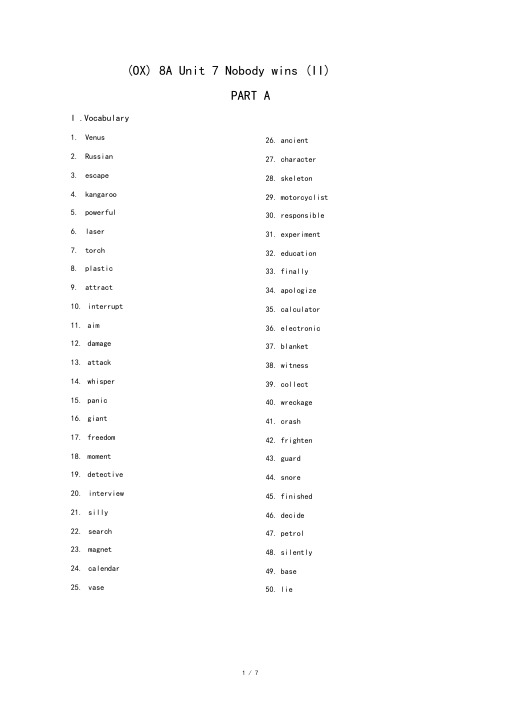
(OX) 8A Unit 7 Nobody wins (II)PART AI .Vocabulary1.Venus2.Russian3.escape4.kangaroo5.powerfulser7.torch8.plastic9.attract10.interrupt11.aim12.damage13.attack14.whisper15.panic16.giant17.freedom18.moment19.detective20.interview21.silly22.search23.magnet24.calendar25.vase 26.ancient27.character28.skeleton29.motorcyclist30.responsible31.experimentcation33.finally34.apologize35.calculator36.electronic37.blanket38.witness39.collect40.wreckage41.crash42.frighten43.guard44.snore45.finished46.decide47.petrol48.silently49.base50.lieII . Useful ExpressionsIII . Useful Structures/Grammar1.After his dinner, he lay down on his bed and fell asleep almost immediately.2.He is too young to go to school.3. I think freedom is the most important thing in our life.4. Those plants will be done for if you don ' t water the soon.5. The famous restaurant is beside/next to the cinema.6. The cinema between the restaurant and the shop.7. The toy shop is opposite the pet shop.8. She doesn ' t havny money.9. How hot it is in the room ! Why don' t weurn on the air conditioner. 10. Are you going to buy anything at the supermarket?PART TWOI .Word FormationII . Complete the sentence with the given word in the correct form.1. The girl wishes to have the(free) to do as she likes.2. I was talking to Ann on the phone when my mother(interrupt) to say that dinner was ready.3. Fireman broke into the burning flat and led the children out of.(safe)4. The police dogs(attack) the robber yesterday.5. According to the law of(attract),you attract what want in your life.6. But the next day I worried: why had I(panic).7. When the fire alarm rang, they left the building.(immediate) 8. The driver turned the wheel to avoid a stone . (lie) ahead. 9. He made a(decide) to study abroad the next year. 10.. The shoe shop(open) from 9 a.m. to 6 p.m..1. bright (adv.)2. power (adj.)3. attract (n.)4. interrupt(n.)5. weak (v.)6. use (n.)7. free (n.)8. safe (n.)9. arrange (n.)10. collect (n.)11. die (adj.) 12. decide (n.) 13. finish (adj.) 14. silent (n.) 15. difficult(n.) 16. calculator".) 17. amazing (v.) 18. understand(n.) 19. friend (adj.) 20. fly (n.)III. Sentence Transformation1.She didn ' t tell me anything about保持原意)She me about it.2.The girls are good dancers.改为感叹句) the girls dance!3.He hid behind some brushes and kept silentW线提问) did he and kept silent?4.Mary was not old enough to go to school.保持原意) Mary was young go to school.5.The sports shop is next to the supermarket保持原意) The sports shop is the supermarket.6.He always has a cup of tea after dinner.改为反意疑问句)He always has a cup of tea after dinner,?IV .Multiple Choice1.Tom couldn ' t come earlier because there was with his bike.A. wrong somethingB. wrong anythingC. something wrongD. anything wrong2.I ' m still hungry. Can you have food?A. more anyB. any moreC. more someD. some more3.In spring, we can hear the birds singing happily^ the tree.A. intoB. onC. atD. in4.---- Is there milk left?---- No. is left in the bottle.A. any; None ofB. any; NothingC. some; NoneD. some; Nothing 5. Look up in the sky. You can see two planes flying the city.A. aboveB. onC. throughD. across6. He runs fast nobody can catch up with him. A. too; toB. enough; thatC. as; asD. so; that7. If he time tomorrow, he will go hiking with his friends. A. will have B. hasC. is going to haveD. have8. We can see about two _____________ p eople doing morning exercises there in thepark every day.12. Don ' t read the sun. You ' d better read the tree. A. under; under B. under; below C. in; inD. in; under13. the couple are very poor, they live a simple and happy life. A. ThroughB. ThoughC. ThoughtD. Thoughtful 14. . they are listening to the English teacher.A. How carefulB. What carefulC. How carefullyD. What carefully 15. I ' m hungry. I want to eat.can do.A. something; SomethingB. anything; AnythingC. something; AnythingD. anything; Something16.— exciting it is to chat with you on the Internet every day!A. HowB. How anC. WhatD. What an17.important news it is!A. hundredB. hundredsC. hundred ofD. hundreds of9. Many bridges have been built Huangpu River. A. onB. aboveC. over10. It ' s not safgoto the street alone. A. acrossB. throughC. byD. throughD. from11. Is there anything important today ' s newspaper. A. onB. atC. inD. for18.1 like to on the sunny beach, basking in the sunshine. A. layB. lie _1C. lyingD. lies19. He his work by during the holidaysA. layB. liedC. laidD. lain20. It was also useful in helping the development team and assign the work. A. break downB. break intoC. break upD. break upVII. Translation1 .这位女孩正站在她妈妈的旁边。
牛津版沪教版英语八年级(上)Unit-7-Memory-词句讲解+练习+答案
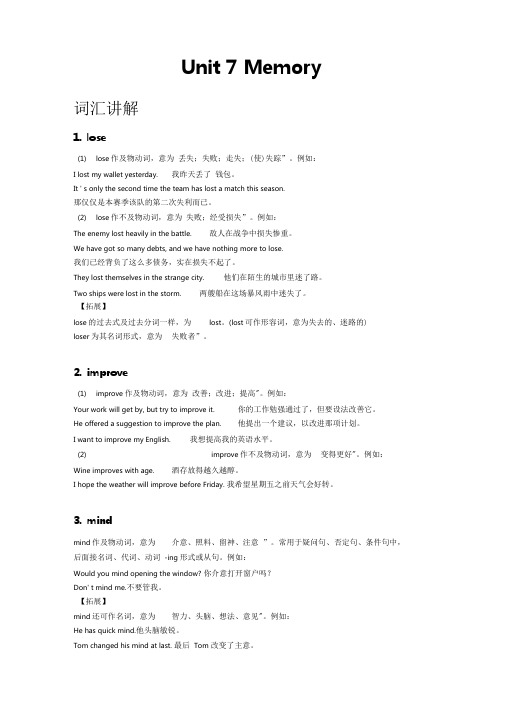
Unit 7 Memory词汇讲解1.lose(1)lose作及物动词,意为丢失;失败;走失;(使)失踪”。
例如:I lost my wallet yesterday. 我昨天丢了钱包。
It ' s only the second time the team has lost a match this season.那仅仅是本赛季该队的第二次失利而已。
(2)lose作不及物动词,意为失败;经受损失”。
例如:The enemy lost heavily in the battle. 敌人在战争中损失惨重。
We have got so many debts, and we have nothing more to lose.我们已经背负了这么多债务,实在损失不起了。
They lost themselves in the strange city. 他们在陌生的城市里迷了路。
Two ships were lost in the storm. 两艘船在这场暴风雨中迷失了。
【拓展】lose的过去式及过去分词一样,为lost。
(lost可作形容词,意为失去的、迷路的)loser为其名词形式,意为失败者”。
2.improve(1)improve作及物动词,意为改善;改进;提高"。
例如:Your work will get by, but try to improve it. 你的工作勉强通过了,但要设法改善它。
He offered a suggestion to improve the plan. 他提出一个建议,以改进那项计划。
I want to improve my English. 我想提高我的英语水平。
(2) improve作不及物动词,意为变得更好"。
例如:Wine improves with age. 酒存放得越久越醇。
I hope the weather will improve before Friday. 我希望星期五之前天气会好转。
牛津版沪教版英语八年级(上)Unit 7 Memory 语法讲解+练习+答案

Unit 7 Memory语法讲解:条件状语从句,if…not=unless由引导词if或unless引导的状语从句叫做条件状语从句。
在英文中,条件是指某一件事情实现之后(状语从句中的动作),其它事情(主句中的动作)才能发生,通常译作“假如”。
从句的位置可在主句之前或之后(从句在前,一般需要用逗号与主句分隔)。
一、if引导的条件状语从句条件状语从句最常用的引导词是if(连词)。
(1)主现从现构成:主句(一般现在时态)+ if 从句(一般现在时态)用法:讲述自然规律,肯定会发生的事情或客观事实。
例如:If you take a fish out of water, it dies.如果把鱼从水中拿出,它会死。
If you put a piece of paper into water, it gets wet. 如果你把一张纸放进水中,它会变湿。
If you put salt into water, it disappears. 如果你把盐放入水中,它会消失。
If you heat ice, it turns into water. 如果你加热冰块,它会变成水。
Steam turns into water if you cool it. 如果你冷却水蒸气,它会变成水。
Oil floats if you pour it on water. 如果你把油倒入水中,它会漂浮。
(2)主将从现、主祈从现、主情从现构成:主句(一般将来时态、祈使句、情态动词)+ if 从句(一般现在时态)用法:谈论将来可能会发生的情况。
例如:①I’ll buy a car if I have enough money. 如果我有足够的钱,我会买一辆车。
They won’t go out if it rains heavily tomorrow. 如果明天下大雨,他们不会外出。
②Be careful when you cross the road. 过马路时要小心。
牛津上海版英语八年级上册《Unit 7 Nobody wins (II)》教学设计5
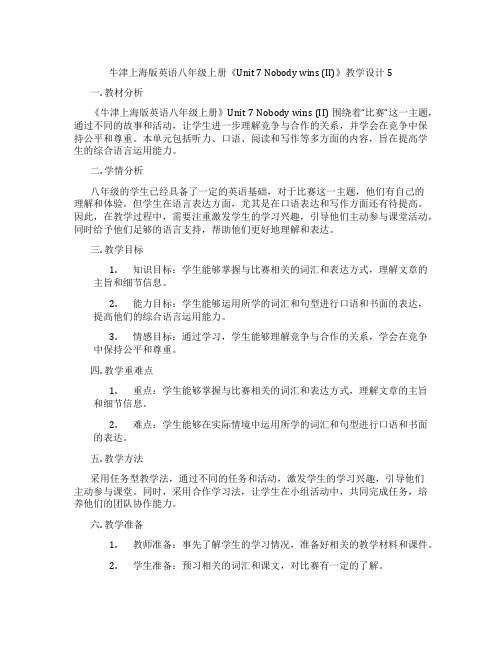
牛津上海版英语八年级上册《Unit 7 Nobody wins (II)》教学设计5一. 教材分析《牛津上海版英语八年级上册》Unit 7 Nobody wins (II) 围绕着“比赛”这一主题,通过不同的故事和活动,让学生进一步理解竞争与合作的关系,并学会在竞争中保持公平和尊重。
本单元包括听力、口语、阅读和写作等多方面的内容,旨在提高学生的综合语言运用能力。
二. 学情分析八年级的学生已经具备了一定的英语基础,对于比赛这一主题,他们有自己的理解和体验。
但学生在语言表达方面,尤其是在口语表达和写作方面还有待提高。
因此,在教学过程中,需要注重激发学生的学习兴趣,引导他们主动参与课堂活动,同时给予他们足够的语言支持,帮助他们更好地理解和表达。
三. 教学目标1.知识目标:学生能够掌握与比赛相关的词汇和表达方式,理解文章的主旨和细节信息。
2.能力目标:学生能够运用所学的词汇和句型进行口语和书面的表达,提高他们的综合语言运用能力。
3.情感目标:通过学习,学生能够理解竞争与合作的关系,学会在竞争中保持公平和尊重。
四. 教学重难点1.重点:学生能够掌握与比赛相关的词汇和表达方式,理解文章的主旨和细节信息。
2.难点:学生能够在实际情境中运用所学的词汇和句型进行口语和书面的表达。
五. 教学方法采用任务型教学法,通过不同的任务和活动,激发学生的学习兴趣,引导他们主动参与课堂。
同时,采用合作学习法,让学生在小组活动中,共同完成任务,培养他们的团队协作能力。
六. 教学准备1.教师准备:事先了解学生的学习情况,准备好相关的教学材料和课件。
2.学生准备:预习相关的词汇和课文,对比赛有一定的了解。
七. 教学过程1.导入(5分钟)通过提问的方式,引导学生谈论他们喜欢的比赛,并简要介绍他们所知道的与比赛相关的词汇。
2.呈现(10分钟)教师通过课件,展示与比赛相关的词汇和表达方式,让学生进行认读和学习。
3.操练(10分钟)学生分成小组,进行角色扮演,模拟比赛的情境,运用所学的词汇和句型进行口语表达。
牛津沪教版英语八年级上册Unit7 复习学案

八年级上Unit 7复习一、课前回顾上一单元重点单词默写1.__________ v. 跃出;突然弹出2 .____________ n. 圈套;陷阱3. _____________ adj.正确的,真实的;真正的4. _____________ n. 和平, 和睦, 安宁,宁静,平静5.______________ n.善意的行为,恩惠6.______________ v. 信任,信赖上一单元重点短语回顾1.__________________用完2.__________________be close to离……近3._________________ 两层楼高4. ______________________从……出去5. _______________________________开始做某事6.__________________________________帮某人一个忙9.______________________________ 使我们毛骨悚然10. _________________________赞成,支持11. _______________________________(指希望)实现二、本节内容本单元重点单词梳理1. immediately adv.立即;马上e. g. I recognized her immediately. 我立刻认出了她。
He came immediately when he heard the news. 他一听到这个消息,马上就来了。
【近义】at once立刻,马上right now立刻right away立刻【例题】选出与画线部分意思相同或相近的选项。
They're leaving for Nanjing at once.A. at the same timeB. at that timeC. right nowD. just now【解析】at once表示“马上,立刻”,at the same time意为“同时”,at that time意为“在那时”,right now意为“现在:此刻”,just now意为“刚才”,所以正确答案选C。
沪教牛津版-英语-八上-教案:unit7 Grammar
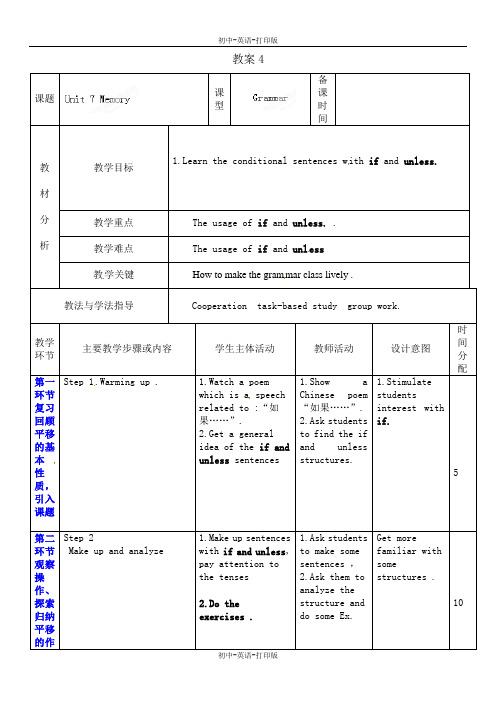
教案4课题课型备课时间教材分析教学目标1.Learn the conditional sentences with if and unless.教学重点The usage of if and unless. .教学难点The usage of if and unl ess教学关键How to make the gram mar class lively .教法与学法指导Cooperation task-based study group work.教学环节主要教学步骤或内容学生主体活动教师活动设计意图时间分配第一环节复习回顾平移的基本性质,引入课题Step 1.Warming up . 1.Watch a poemwhich is a speechrelated to :“如果……”.2.Get a generalidea of the if andunless sentences1.Show aChinese poem“如果……”.2.Ask studentsto find the ifand unlessstructures.1.Stimulatestudentsinterest withif.5第二环节观察操作、探索归纳平移的作Step 2Make up and analyze1.Make up sentenceswith if and unless,pay attention tothe tenses2.Do theexercises .1.Ask studentsto make somesentences ,2.Ask them toanalyze thestructure anddo some Ex.Get morefamiliar withsomestructures .10法第三环节课堂练习Step 3.Practise 1.Play a game:students talkabout the dreams.Each sentence mustbe connected withthe one before it .1.Tell thestudents therules of thegame.2.Be the judgeand correctthe mistakes.Prac tice andimprovespeakingability andconsolidate .5第四环节课时小结Step4: Production 1.Make up their o wndialogues in groupsa nd then act themout1.G etstudents tomake up adialogue usingif and unlessin a situationand then askthem to actout .创设想关情景使学生巩固所学,真实感受语法规则。
最新牛津上海版英语八年级上册《chapter 7 nobody winspart Ⅱ》教案.doc

Chapter7Nobody wins(Ⅱ)Reading章节分析(Reading section)(一)综述本单元的阅读部分是前面一个单元的故事的后半部分。
讲的是Captain King如何巧妙地击伤怪物Gork,成功地逃离山洞,回到了地球。
在对第一部分了解的基础上,学生们对于故事的发展和结局充满着期待,所以,教师应充分利用学生的兴趣,充分发挥他们的想象,在情节的不断推进和阅读的不断深入中教授。
本课的任务有两个:1学生通过对课文的学习,掌握一些核心词汇。
2通过学习课文,了解故事的情节如何展开,如何阅读,为speaking和writing部分做准备。
(二)阅读目标1知识目标学习课文中重点词、词组、句型和语法。
2能力目标掌握阅读方法,进一步提高阅读的能力。
3情感目标鼓励学生充分发挥想象能力,激起学生探询宇宙奥秘的兴趣。
(三)教学方法采用任务型教学法组织教学,通过听说,讨论等具体活动,达到教学效果。
(四)重点和难点1词汇学习1)核心词汇aim,attack,attract,escape,interrupt,damage,trick,search,hold,whisper, feel,freedom,safety,figure,fear,painting,row,rubber,speed,opening,free,silly,weak,immediately,eventually,sil ently,exactly,maybe,nearby, towards,someone,somebody,something,anybody,no one,nobody2)拓展词汇crew,laser,torch,beam,panic,snore,roar,light-producing,,prisoner, notice-board,stool3)词组和短语lie down,fall asleep,escape from,moments later,be out of...,wake up, aim...at...go out,have a bad dream,by this time,at a time,feel one’s back,make sure, done for,get inside...,climb into...,get free,get back to...,happen to sb.,no longer, at once,weigh less,weigh more2句型学习The simple past tense to develop a story.教学设计(Teaching Designs)教学内容Pre-reading 教学实施教学资源参考1.进行宇宙知识的小竞赛,引入一些知识背景的介绍,二十一世纪英同时激发学生们对外部空间探求的兴趣。
- 1、下载文档前请自行甄别文档内容的完整性,平台不提供额外的编辑、内容补充、找答案等附加服务。
- 2、"仅部分预览"的文档,不可在线预览部分如存在完整性等问题,可反馈申请退款(可完整预览的文档不适用该条件!)。
- 3、如文档侵犯您的权益,请联系客服反馈,我们会尽快为您处理(人工客服工作时间:9:00-18:30)。
Unit 7 Memory一.必背词汇及短语(3) 重点句子:1. A great way to help you remember something is to imagine a picture of it in your mind. 帮你记住某物的一个好方法是在脑海里想象它的一幅画面。
2. Remember:a picture is worth a thousand words. 记住:一幅图片胜过千言万语。
3. If you wish to get a good job, there are many important steps you should take. 如果你希望得到一个好工作,有许多你应该采取的重要步骤。
4. Unless you get enough sleep every night, you will not remember things well. 除非你每晚有充足的睡眠,否则你将记性不好。
5. You will be late for school if you do not leave now. 如果你不现在离开,你将会上学迟到。
6. How to improve your memory? 如何提高你的记忆?一.必背词汇及短语单词1. memory n. v.记得=2. corner n.3. lose v. ( / ) n.4. improve v. = n.5. mention v.6. method n. =7. spelling n. v.拼写( / )8. mind n. v.介意9. silly adj. 同义词反义词10. mile n.11. letter n. 12. worth adj.13. spell v. n. 14. unless conj.15. trouble n. v. 16. list n. v.17. step n. v.迈步行走18. cycle n.19. similar adj. n.相似处20. note n. v.21. wallet n. 22. basket n.23. manager n. v. 管理成功n.管理短语1. take (从银行账户中)提取(款)2. out 涌出3. write 写下,记下4. 例如5. between…and…6. plan sth 计划干某事7. help sb sth 帮助某人做某事8. wish sth 希望干某事9. have trouble sth 做某事有麻烦be trouble 与…相处有麻烦/ …into trouble 使…陷入困境10. practice sth 练习做某事11. give / give sth sb 给某人某物12. buy sth sb 为某人买某物13. far away 14. a life 过健康的生活15. … …一个…另一个16. 不得不17. It’s + ad j + sb + sth 对某人来说做某事是…三.语言点1.When we make new memories,we lose old onesLose:(lost;lost):丢失;失去Ones: 代词;是one的复数;泛指前文提到的某些人或物2.Because they want to help students improve their memory?二者都有“因为”之意,但用法不同:because作连词,用于引导原因状语从句或作why开头问句的答语,常用于表示直接原因。
而because of是复合介词,后跟名词或代词。
试比较:Because he is ill,he is absent today.He can't come because of the heavy rain.Improve:改善;提高;意为make。
better3. A great way to help you remember something is to imagine a picture of it in your mind.way 相关用法总结1)way to do sth=,way of doing sth =,做某事的方式2)do sth in this/that way, 以这种或者那种方式做某事3)on the way to 在去什么的路上(当地点为home, here there时介词to省略)4)in the way 挡路/by the way 顺便说一下Imagine: 想象;名词形式为imagination 想象力;imagine+doing sth;想象做某事4.I know you are busy,but it worth the timeBe busy with sth/ be busy doing sth; 忙于某事、忙于做某事be worth doing sth 值得......The movie is worth watching5. If you wish to get a good job, there are many important steps you should take.hope;wish两个词用作动词,均有“希望”的意思,都可接不定式作宾语,不接动词-ing形式,两个动词都可接宾语从句。
hope与wish都表示“希望”,两者不同之处在于:hope表示实现可能性大的希望,而wish只表示主观愿望,不考虑能否实现,常用于不能实现的场合,从句的谓语动词要用过去式(be用were)来表达现在或将来与事实相反的愿望。
试比较:I hope they can help us.我希望他们能来帮助我们。
I wish they could help us.我真希望他们能来帮助我们。
wish后还可接形容词、不定式作宾语补足语,以及后接双宾语表示祝愿,而hope不能这样用。
如:I wish you tocome here soon.我希望你尽快来这里。
6.Unless you get enough sleep every night, you will not remember things well.连词unless意为“除非……如果不……”,“除了……”,多引导一个否定意义的真实条件句,有时也可引导非真实条件旬。
unless引导条件句时.1)enough用作副同,充当形容词或副词修饰语,但必须后置。
又如:①He walks slowly enough.enough用作形容词作定语时,可修饰可数名词或不可数名词,可放在被修饰的名词前或后。
如:①There are enough seats(seats enough)for them all.8. For example you may have trouble remembering the lists of steps in the water cycle..have trouble (in) doing sth. 做……有困难。
(in 可以省略)Get sb....into trouble 使某人陷入麻烦之中Be in trouble: 处于困境中9.Let's take a bus.let用作使役动词,表示“让”,其用法为let sb do sth,而 let’s 中的’s(=us)在反意问句中,let's 的反意疑问句,用 shall we。
Let us的反意疑问句用will you如:Let’s go swimming together, shall we?Let us go swimming together, will you?let’s 的否定式可以是 let’s not, don’t let’s。
如:Let’s not hurry. / Don’t let’s hurry.10.What does scientist think about words that sound similarSound 听起来,似乎,其后加形容词作表语;同样用法的词有:Similar:相似的;相像的;其名词形式为similarity;常用词组为be similar to11.If you take a fish out of water,it dies1.if 引导的条件状语从句,表示假设,其结果一定会发生,从句和主句时态都用一般现在时:eg: If you heat ice, it turns into water.以下四个词均与“死”有关。
die是终止性动词,意为“死亡”、“断气”,指生命的结束,强调动作。
例如:His grandmother died two years ago.dead意为“死的”、“无生命的”,常与be动词连用,表示死的状态。
例如:He has been dead for two years.dying是die的现在分词,通常作形容词使用,表示“要死”、“垂危”、“濒临死亡”之意。
例如: He is dying.death是die的名词,意为“死”、“死亡”。
例如:It makes me very sad when I think of my little dog's death12.Can you give me an exampleGive sb sth 给某人某物;也可改成give sth to sb常见的双宾动词有:give, show, send, bring, offer, read, pass, hand, tell, return, write,give sb. a call 给……打电话give back 归还,送回give out 分发,散发,用光,耗尽give away 泄密give off 发出(光,烟,气)give a hand 伸出援手13.Then it either forgets them or passes them into long -term memoryeither… or .... 或者.....或者;不是....就是当either… or …, neither… nor … ,not only… but also …等连接主语时. 谓语动词的人称和数常常与最近作主语的词语保持一致填空版1. When we make new memories,we lose old onesLose:过去式与过去分词(________;______):丢失;失去Ones: 代词;是one的复数;泛指前文提到的某些人或物3.Because they want to help students improve their memory?二者都有“因为”之意,但用法不同:because作连词,用于引导原因状语从句或作why开头问句的答语,常用于表示直接原因。
